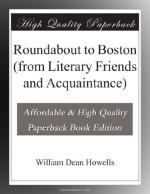I first saw him at the pretty villa where he lived in the suburbs of Trieste, and where I passed several days, and I remember him always reading, reading, reading. He could with difficulty be roused from his book by some strenuous appeal from his family to his conscience as a host. The last night he sat with Paradise Lost in his hand, and nothing could win him from it till he had finished it. Then he rose to go to bed. Would not he bid his parting guest good-bye? The idea of farewell perhaps dimly penetrated to him. He responded without looking round,
“They,
hand in hand, with wandering steps and slow,
Through
Eden took their solitary way,”
and so left the room.
I had earlier had some dealings with him as a fellow-consul concerning a deserter from an American ship whom I inherited from my predecessor at Venice. The man had already been four or five months in prison, and he was in a fair way to end his life there; for it is our law that a deserting sailor must be kept in the consul’s custody till some vessel of our flag arrives, when the consul can oblige the master to take the deserter and let him work his passage home. Such a vessel rarely came to Venice even in times of peace, and in times of war there was no hope of any. So I got leave of the consul at Trieste to transfer my captive to that port, where now and then an American ship did touch. The flag determines the nationality of the sailor, and this unhappy wretch was theoretically our fellow-citizen; but when he got to Trieste he made a clean breast of it to the consul. He confessed that when he shipped under our flag he was a deserter from a British regiment at Malta; and he begged piteously not to be sent home to America, where he had never been in his life, nor ever wished to be. He wished to be sent back to his regiment at Malta, and to whatever fate awaited him there. The case certainly had its embarrassments; but the American consul contrived to let our presumptive compatriot slip into the keeping of the British consul, who promptly shipped him to Malta. In view of the strained relations between England and America at that time this was a piece of masterly diplomacy.




